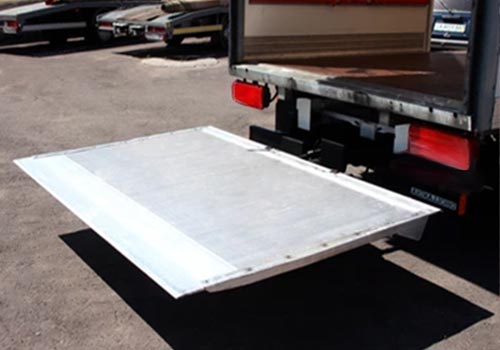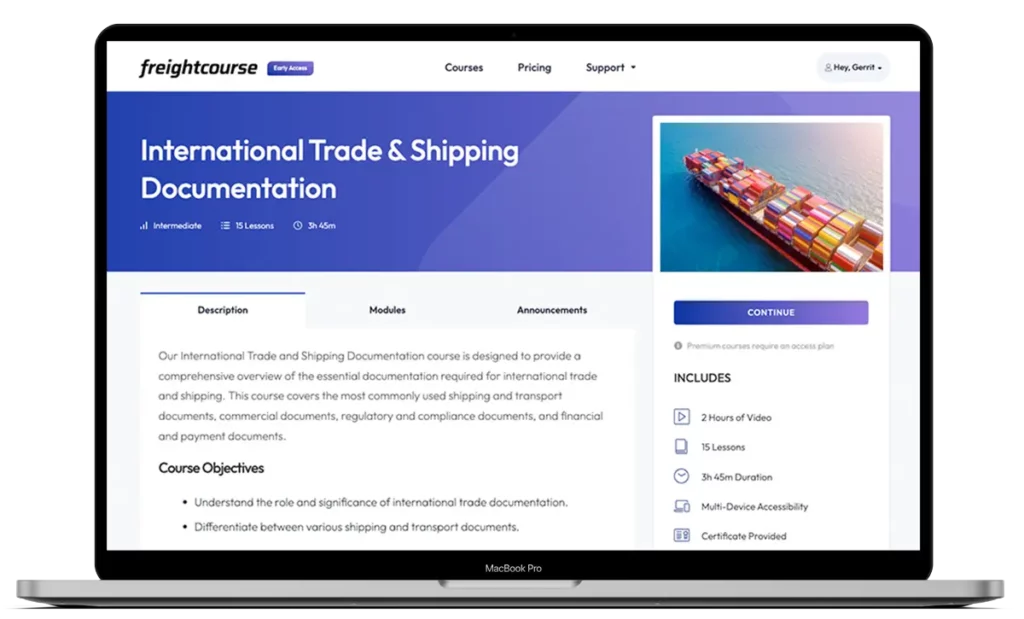There are many types of accessorial trucking charges, depending on the extra service requirements that are needed. These services cover special transport, additional equipment and truck type among several other things. One of the most common accessorial charges is the liftgate fee.
A liftgate fee is charged when loading or unloading is done using a truck’s lift gate, also commonly known as tail lift. The liftgate fee is usually about $100 to $250, depending on the carrier, truck type and amount of cargo being loaded or unloaded.
Not all trucks are equipped with a liftgate, therefore special arrangements have to be made by the trucker beforehand. Additionally, these tail lifts are often expensive and require regular maintenance.
In this article, we’ll be taking a closer look at liftgate trucks and liftgate services. In particular, we’ll discuss how much they cost, why they are charged and how to arrange a liftgate service with your transportation provider.
What Is a Liftgate Truck?
A liftgate truck is a regular box truck that has a lift gate or a tail lift attached to the back of it. When loading or unloading cargo from a truck becomes a challenge due to certain reasons, a liftgate is used to make this process easier.

The liftgate is a mechanical platform that can be raised and lowered through hydraulics. This helps material handling equipment (MHE), such as hand pallet trucks and trolleys access the cargo more easily during the loading and unloading process.
Depending on the lift gate model and size, a unit can cost anywhere between $2,000 to $7,000. Lift gates can handle up to around 3,500 pounds (about 1.6 tons) and fold up after use.
How Much Is a Liftgate Service Fee?
A liftgate service fee is typically around $100 to $250. However, the final price depends on the carrier, cargo details and additional requirements to facilitate the loading and unloading process.
Below is a compilation of liftgate service fees for some of the most common trucking companies in the United States. Please note that the information below should be used as reference only.
These rates are indicative and subject to change without notice of the carrier. Please check the most accurate fees directly from their respective tariff brochures.
| Company | per 100 lbs (CWT) | Minimum Charge | Maximum Charge | Link |
| AAA Cooper Transportation | $5.60 | $90.00 | $341.25 | Tariff |
| ABF Freight | $9.75 | $185.00 | $450.00 | Tariff |
| Dayton Freight | $6.50 | $115.00 | $250.00 | Tariff |
| Estes Express | $4.95 | $75.00 | $350.00 | Tariff |
| Fedex Freight | $8.74 | $129.00 | $426.00 | Tariff |
| Old Dominion | $3.75 | $80.00 | $275.00 | Tariff |
| R+L Carriers | $12.00 | $171.70 | $565.00 | Tariff |
| SAIA | $9.69 | $131.50 | $305.00 | Tariff |
| Southeastern Freight Lines | $7.25 | $95.00 | $500.00 | Tariff |
| UPS Freight | $7.50 | $100.00 | $350.00 | Tariff |
| XPO Logistics | $10.00 | $191.75 | $468.75 | Tariff |
| YRC Freight | $7.52 | $149.00 | $350.00 | Tariff |
When Is a Liftgate Service Required?
Liftgate services are an accessorial charge and are therefore not a common arrangement – only if required. Whether a liftgate service is needed depends mainly on two things, the cargo type and the infrastructure of the pickup and delivery location.
- Cargo Type: Items such as heavy equipment or machinery, personal effects, or any voluminous cargo, including cartons on pallets would possibly need a lift gate for safe unloading. This is usually the case if the site has no loading bays and the cargo can’t be removed by hand.
- Facility: Certain facilities have no loading bays, meaning that MHEs are not able to unload pallets from the truck directly. In these scenarios, a liftgate service is usually rendered so that the material handling equipment can be lifted on and off to access the goods.
Additionally, certain buyers may not want to purchase forklifts or other material handling equipment, as they can be very costly. They may request for liftgate services from their preferred carriers instead.
Another scenario is for personal purchases where the item is voluminous or heavy and cannot be hand-carried. A good example for this are appliances such as fridges, washing machines or office equipment such as tables, shelves among many others.
Here are some additional examples of when a liftgate service would make sense (for personal buyers or buyers without loading bays):
- Kitchen Appliances (washing machines, fridges, etc.)
- Office Equipment (tables, commercial printers, etc.)
- Heavy Machinery (pumps, machines, cable rolls, etc.)
- Tools & Equipment (generators, lawn mowers, etc.)
- Relocation (Furniture, larger items, etc.)
Do All Carriers Offer Liftgate Services?
Most dedicated full-truckload (FTL) carriers don’t have lift gates equipped on their trucks, as they typically deliver an entire truck’s load to consignees, who usually have loading bays.
Therefore, it’s more common for less-than-truckload (LTL) operators to offer liftgate services – or of course carriers who provide both FTL and LTL services. However, it’s always prudent to check the service features of your transportation provider.
In their service or tariff brochures, you’ll commonly find an item called “liftgate fee”, “liftgate service fee” or even “tail lift service fee”. If you’re not able to locate this, it’s best to inquire directly with them.
How to Request for a Liftgate Service
When organizing a delivery, it’s best to get in touch with the appointed carrier directly. You’ll need to provide basic delivery information such as pickup and delivery address, description of the goods, number of pieces, weight, and dimensions.
The trucking company may recommend other equipment such as pallet jacks, to easily facilitate the unloading or loading of the cargo. After they have assessed the information you shared, they will provide a quote, where you are required to review and approve.
Lastly, it’s highly recommended to read the service terms and conditions before proceeding.
In summary, remember to inform your trucker of the following and request for assistance or ask for recommendations if required:
- Loading bay availability
- Pickup and delivery address
- MHE availability
- Cargo description

Get Free Course Access
If you enjoyed the article, don’t miss out on our free supply chain courses that help you stay ahead in your industry.

Andrew Lin
Co-Founder & Writer
at freightcourse
About the Author
Andrew is a multi-business owner with over 12 years of experience in the fields of logistics, trucking, manufacturing, operations, training, and education.
Being the co-founder of freightcourse has given him the ability to pursue his desire to educate others on manufacturing and supply chain topics.
Follow us